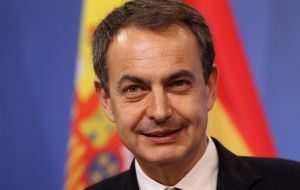MercoPress. South Atlantic News Agency
Latinamerica, one of the very few benefiting from Spain’s EU presidency
 Rodriguez Zapatero was overwhelmed by the Euro crisis and the fragility of the Spanish economy
Rodriguez Zapatero was overwhelmed by the Euro crisis and the fragility of the Spanish economy Spain's ambitious six-month presidency of the EU was eclipsed by the European debt crisis which thrust the country's fragile economy into the global spotlight and weakened the Spanish government, analysts said.
Among the significant events during the Spanish presidency was the May 18-19 EU summit with Latin America in Madrid at which association accords were signed with the countries of Central America, Peru and Colombia and negotiations with the Mercosur bloc, frozen since 2004, were re-launched.
Socialist Prime Minister Jose Luis Rodriguez Zapatero had planned to use the six-month presidency of the 27-nation bloc, which wraps up on July 1 when Belgium takes over, to bolster his international stature.
But nothing went as planned as the eruption of the Greek debt crisis, and the subsequent fears that it could spread to other southern European nations like Spain and Portugal, caused stock markets and the euro single currency to plunge.
Under pressure by EU heavyweight Germany, the Spanish government adopted unpopular austerity measures, including public sector spending cuts, aimed at slashing a public deficit that hit 11.2% of GDP in 2009, the third-highest after Greece and Ireland.
The government also adopted an overhaul of its rigid labour market as recommended by the International Monetary Fund to fight an unemployment rate of 20%.
The reforms, which make it easier and less expensive to fire workers, put an end to Rodriguez Zapatero's honeymoon with the nation's unions, which have called a general strike for September 29, and caused his popularity to drop.
Spain was ending its stint as EU president as a “protectorate” of the bloc with its “economy managed from abroad”, the leader of the main opposition Popular Party, Mariano Rajoy, charged during a debate with Rodriguez Zapatero in parliament.
“The circumstances of the Greek crisis and the widespread problem of fiscal deficits overtook Spain as they would have overtaken any rotating presidency,” said Ignacio Molina, a Europe analyst with the Elcano Institute think tank in Madrid.
“But Spain also emerged as one of the weakest countries in this scenario. It found itself without a margin for manoeuvre, being in the position of judge and litigant at the same time. It was difficult for other countries to consider it a neutral president,” he added.
Hierlemann Dominik, a specialist in European affairs at German's Bertelsmann Foundation, said all other priorities “such as relations with the Maghreb, the rights of women, were swept away by the crisis in the euro, they were marginalized.”
On the diplomatic front Spain's presidency of the EU was marked by the cancellation of two key summits, one with the United States in May and the other with the Mediterranean Union in June.
The EU-US summit was called off after US President Barack Obama cancelled the trip citing his busy schedule while the Mediterranean Union summit was postponed to give time for progress in indirect talks between Israel and the Palestinians.
The death of Cuban dissident Orlando Zapata in February torpedoed Spain's bid to get the EU to soften its common position regarding the communist island.
Spain did achieve its goals for the EU-Latin America summit held last month with the announcement of a free trade agreement between the bloc and Central America and the re-launch of free trade talks with South American trading bloc Mercosur.
Rodriguez Zapatero defended Spain's performance during the EU presidency, saying Wednesday it had been “satisfactory” and “useful”.
He pointed to the approval at an EU summit last week of Madrid's proposal to make bank stress tests public -- which he said would be “fundamental” to restore calm in the markets -- as an example of the success of the Spanish presidency.
“We had to deal with difficult circumstances for the European Union and also for our country,” he added.




Top Comments
Disclaimer & comment rules-

Read all commentsSpainb - the weakest link!
Jul 06th, 2010 - 06:42 pm 0Is it trying to aid its South American colonies?
Commenting for this story is now closed.
If you have a Facebook account, become a fan and comment on our Facebook Page!